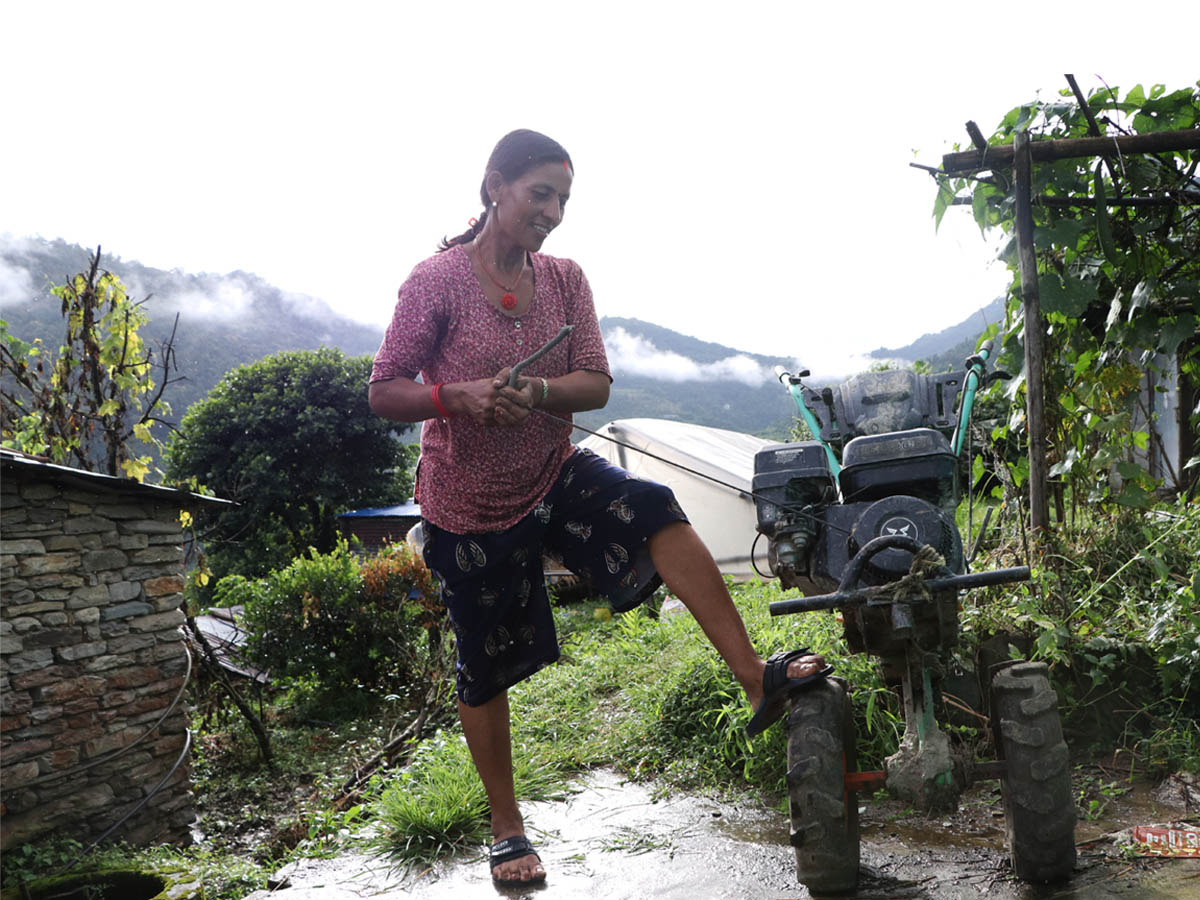Case one
June 3, 2019. A day of horror for her.
It was in the middle of the night when she heard a knock on her door. Since the weather was really bad and it was windy outside, she thought people may be in trouble and were seeking help. She, thus, opened the door. 
There were two men at her front door – one was in a police uniform and she thought they were there for some investigation. But she was wrong! They were predators. She was raped by both the men. The policeman, who is supposed to be a protector of citizens, turned out to be a ravager.
The woman in question is a resident of Tulsipur, Dang, where she used to live in a rented room.
Police investigation later revealed that the man in uniform was a senior head constable at the Tulsipur Area Police Office. The woman filed a complaint at the police office but the man kept tormenting her. Investigation further revealed that the perpetrator had raped her again, while in uniform, by intimidating and coercing her. The police submitted the report at the office of the government lawyer. The Dang district attorney office filed a case against the two perpetrators. Filing the case was itself quite a task for the woman. However, once in court, astonishingly, she changed her testimony. She told the court that she had filed a false complaint and that the injuries on her body were not caused by rape but as a result of her falling.
An activist on condition of anonymity revealed that the woman [the victim] was offered Rs 100,000 to change her statement and she was promised another Rs 400,000 after the case was settled. This was an informal deal and she was not given a single penny. On the basis of her testimony, the court gave a clean chit to both the culprits on September 1, 2019. Five months later, Tulsipur High Court upheld the verdict of the district court.
An examination of the complaints and documents filed at the time and the police report clearly indicate that the victim changed her testimony because she was no longer able to resist societal pressure, including from her relatives.
Case two
A 17-year-old boy deceived a 16-year-old girl into a romantic affair and had sex with her by promising that he would marry her. For one whole year, he coaxed her into having a sexual relationship with him and abused her. Later her mother reported the case to the police stating that the girl had been raped from April 2019 to June 2019 after confining her in a room in Ghorahi-10, Narayanpur. The court ordered the boy be kept in a child rehabilitation center for further interrogation but later both the girl and her mother changed their testimonies at the court. According to the mother, they changed the statement then because they were forced to do so.
This only fueled the pain in the 16-year-old adolescent girl. In September 2019, district judge Ritendra Thapa declared the boy innocent and sentenced the plaintiff (the woman) to 15-day imprisonment and fined her Rs 500. The verdict also declared that the plaintiff had to pay Rs 15,000 as compensation to the boy (the perpetrator). The verdict read: “It is not right that the minor boy has to be accused of rape and isolated. It is determined that the plaintiff woman, bent on snatching individual freedom of the minor, is handed down imprisonment and fine.”
The woman says that she changed her statement due to pressure from her relatives. “I did all this for the sake of my daughter’s future,” said the woman. “Many said she would be ostracized as a raped girl by the society and I was scared about it.” “It was not only the boy’s family but even my relatives who said that this would bring shame on us. Nobody supported us. Everyone intimidated us,” the woman said.
When a victim withdraws the case while the investigation is underway or when a victim changes their testimony in court, then in legal terms, it is called that the victim has turned ‘hostile.’ In Dang, the trend of victims turning hostile is rising in recent times. Rape cases are filed but are soon withdrawn while the proceedings are continuing or before the hearing starts.
There are several cases of rape survivors changing their testimonies in the court. Why is it so? Hiranya Prasad Bhandari, who was previously a court officer at Dang District Court, says there are various factors behind this. “Financial inducements, societal pressure, fear, and coercion are some major factors that turn rape victims hostile in the court,” he said. Pradeep Gautam, an advocate who has long been advocating for rape victims, agrees with Bhandari. “The rape victims [girls and women] are often on their own, and they face pressure from all around for reconciliation. And they change their testimonies thinking that it will help them save their honor in society,” said Gautam. According to Gautam, as the victims turn hostile, it makes the case against perpetrators weak and further emboldens the perpetrators of the heinous crime. “This further victimizes the victims while the culprits walk free in society. The victims, instead of getting justice, suffer further injustice,” said Gautam.
Rape in number
A total of 107 rape complaints have been registered in the District Police Office in Dang in the last fiscal year. According to Informal Sector Service Center (INSEC) Nepal, 47 incidents of rape were reported in the first six months of 2024 – which also includes cases of incest, such as a father raping his daughter. 228 cases of rape were registered in District Court Dang in the last fiscal year. Out of these, 143 cases have been closed, and 85 cases are pending.
The victims turn hostile in such situations. The victim is often instilled with the fear of loss of family prestige.
Instances of cases of securing acquittal of the perpetrators by turning the victims hostile in the court – by making them change their testimonials – are rising by the day. Incidents of the victims themselves being punished are also growing at a same proportion. There are cases where the woman changes her testimonial in the court and the court reaches a conclusion that the victim filed a fake case.
The bench at the court does not seem to pay enough consideration to why the victims change their testimonies, contributing to the trend of the perpetrators being absolved of crimes. Kripasur Karki, district judge at Dang District Court, says the court started to deal in a tough manner in such cases because the trend of assassinating someone’s character by alleging rape and thus wasting the resources and time of the state is rising. People file cases of rape and then later claim that cases were filed out of emotion. In such a situation, the persons who file cases receive punishment – imprisonment and fine.
Crime and punishment
A 14-year-old girl was staying in a hostel in Dang district. The eighth grader was repeatedly raped by the hostel manager himself. Soon she filed a complaint at the District Police Office in Dang. But a week later, she changed her testimony because her family members and neighbors started to blame her instead of the perpetrator. According to her, they treated her (the victim) as the perpetrator, and accused her of wrongdoings so much so that she thought she would not be able to live in that society. So, she said, she turned hostile.
Indeed, it is a crime to deliberately furnish false witness to the police and to lie in court after taking an oath that the witness will speak the truth. There is a clear legal provision for punishment in such cases. If a person is prosecuted on a fake charge, the person has to bear a lot of trouble for the crime they have not committed. This is why there is such a law, said court officer Bhandari. There also is a trend of taking rape cases to the court in a planned way and then changing the testimonies after bargaining with the perpetrator, according to advocate Goma Mahara. “Due to such false cases, chances of even the real victims getting justice become slim,” she said. Women rights activists define hostile witness in rape cases as a form of violence. According to them, family, society and the state have failed to ensure protection of the raped women and as a result they have to fight the battle alone.
The court has not paid much attention toward this, they argue. This promotes incidents of rape in the society. As the trend of changing testimonies out of pressure and inducement has increased it has also impacted the justice resolution on the basis of real evidence apart from raising questions about the court system, says Sushila Paudel, women rights activist and president of Network for Protection of Women’s Human Rights, Dang district.
According to District Police Office Dang, incidents of rape have gone up disproportionately in recent years. According to Rajan Kumar Gautam, then spokesperson and Deputy Superintendent of Police (DSP), most rape crimes are committed by family members and relatives. He also attributes it to the misuse of social media. “To minimize such cases, Nepal Police has been conducting various types of programs in the community under its police-community partnership program,” he said. “If we are able to impart sex education to students at the school level then this could probably help to minimize the incidents of rape.”
Read this story in Nepali here.
Read our guidelines for Republishing this story here.



